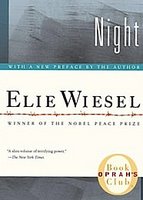"Night" by Elie Wiesel
 Much of mankind's history is fraught with tragedy so severe that it is almost unbelievable. Some simple yet severe examples have happened in only the last 2 centuries. The destruction of the race of Indigenous Americans, Indians, and the slaughter of the Jews during the Holocaust. These things should never be forgotten, lest we repeat them (to paraphrase, Santayana). Elie Wiesel has captured his experience in the book "Night." The amazing thing is that this book, with only 120 pages or so, captures so much emotion, destruction, sadness and loss of faith to cover many lifetimes.
Much of mankind's history is fraught with tragedy so severe that it is almost unbelievable. Some simple yet severe examples have happened in only the last 2 centuries. The destruction of the race of Indigenous Americans, Indians, and the slaughter of the Jews during the Holocaust. These things should never be forgotten, lest we repeat them (to paraphrase, Santayana). Elie Wiesel has captured his experience in the book "Night." The amazing thing is that this book, with only 120 pages or so, captures so much emotion, destruction, sadness and loss of faith to cover many lifetimes. I will warn you this book will play on your conscience long after the book has been read. The amazing and tragic events of the German slaughter of the Jews during World War II really makes one question humanity. This book follows the life of Elie Wiesel during the time period when his family was removed from their home in Sighet, Transylvania by the Germans in 1944 to the Auschwitz concentration camp and then to Buchenwald. Every terrifying event builds onto the other to help destroy a family and to kill Wiesel's innocence, and to eventually destroy his faith in God.
The German SS soldiers take over his village and begin shipping out all Jews to Auschwitz. Upon arrival at Auschwitz Elie and his father are separated from his mother and sisters never to see them again. Keep in mind when this all begins he is only 14 when he enters a concentration camp where the stench of human bodies being burned and the vision of babies being thrown into burning pits changes his life. He and his father then begin their 3 year fight to stay alive living on meager food scraps and having to do labor for the Germans.
One phrase that seems to stick out in this book is when the family is warned that the Germans are exterminating the Jews, Elie's father asks, "Can this be true? This is the 20th century, not the Middle Ages. Who would allow such crimes to be committed? How could the world remain silent?" In his prize acceptance speech for the Nobel Peace Prize for this book, Wiesel says we must continue to fight for human rights and that we must never be silent again.
Trust me, this book will create an overwhelming sorrow deep within. Maybe enough to not allow such actions to ever occur again. I will be assigning this book to my home-schooled step-son and I will be very curious as to see his response.
Labels: book review, books, elie wiesel, holocaust
posted by Gil T. @ 11:06 PM Comments: 0





























